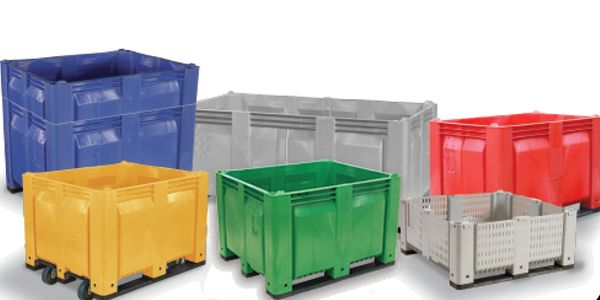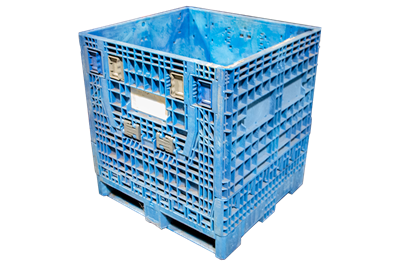How to maintain Bulk Plastic Containers for extended performance
Wiki Article
A Comprehensive Overview to the Various Kinds Of Bulk Plastic Containers Available Today
Bulk plastic containers play a crucial role in various markets, providing solutions for storage and transportation. Their varied types deal with different requirements, from stiff options for strong products to flexible containers suiting various shapes. Each kind offers unique benefits, making it crucial to understand their applications and attributes. As industries progress, so do the needs for effective container options. What elements should one take into consideration when picking the ideal mass container?Review of Mass Plastic Containers

Sorts Of Bulk Plastic Containers
Bulk plastic containers been available in numerous forms, each matched to particular applications. Stiff bulk containers, versatile bulk containers, and intermediate mass containers stand for the key categories, each offering special advantages. Understanding these kinds is important for choosing the ideal container for delivering and storing materials.
Stiff Bulk Containers
Rigid mass containers are critical for effective storage and transportation of various materials across sectors. These containers are usually constructed from sturdy plastics, allowing them to withstand harsh handling and ecological problems. They come in various sizes and shapes, including drums, bins, and totes, making them appropriate for saving every little thing from granular compounds to fluids. Stiff containers commonly feature enhanced wall surfaces and safe and secure covers, ensuring the contents remain protected during transportation. Their stackable style makes best use of storage room, making them suitable for warehouses and manufacturing centers. Additionally, numerous stiff mass containers are recyclable and reusable, adding to sustainability initiatives. On the whole, their robustness and adaptability make stiff mass containers a crucial component in supply chain operations.Adaptable Bulk Containers
Flexible mass containers, often described as versatile intermediate mass containers (FIBCs), act as a functional option for keeping a variety and transferring of dry products. These containers are typically made from woven polypropylene and are created to be lightweight yet strong, allowing for effective handling and stacking. Their adaptability enables them to suit numerous forms and sizes, making them suitable for items ranging from grains to chemicals. FIBCs can be equipped with attributes such as spouts for simple dental filling and discharge, along with protective coverings for improved durability. Furthermore, they are recyclable and recyclable, adding to sustainable practices in sectors such as farming, food handling, and construction. On the whole, versatile mass containers supply a reliable and cost-efficient alternative for mass material administration.Intermediate Bulk Containers
Intermediate bulk containers (IBCs) are vital for the reliable transportation and storage of liquids and granular materials throughout various markets. These containers commonly have a capacity varying from 275 to 330 gallons and are developed for very easy stacking and taking care of. Made from long lasting products like high-density polyethylene or steel, IBCs offer superb defense against contamination and environmental factors. Their style consists of attributes such as a built-in pallet for forklift accessibility and a removable top for very easy filling and cleansing. IBCs are widely used in chemical, food, and pharmaceutical industries, making certain compliance with safety and security laws. Their convenience and reusability make them a cost-effective service for bulk storage space and transport, adding to provide chain effectiveness and sustainability.Features and Advantages of Bulk Plastic Containers
Bulk plastic containers are important tools in different industries, providing a combination of sturdiness and usefulness. These containers are created from high-grade materials, making them resistant to impacts, chemicals, and ecological variables. This robustness assurances product safety throughout storage and transport.Additionally, bulk plastic containers are lightweight, assisting in simplicity of managing and decreasing shipping expenses. Their stackable style makes best use of storage efficiency, enabling enhanced storage facility space. Many designs feature safe lids or closures, providing an airtight seal that maintains components and avoids contamination.
Furthermore, mass plastic containers are recyclable and usually reusable, adding to sustainable techniques. Their adaptability enables a wide variety of applications, from food storage space to industrial usage, improving their worth throughout sectors. Businesses gain from the lengthy life-span and low maintenance needs of these containers, making them a cost-effective solution for both long-lasting and temporary demands.
Industries That Use Mass Plastic Containers
Numerous markets benefit from the use of mass plastic containers, each leveraging their one-of-a-kind homes for particular applications. The food and beverage sector depends on these containers for risk-free storage space and transport of products, while the chemical manufacturing market utilizes them for dealing with hazardous materials. In addition, the pharmaceutical circulation needs highlight the relevance of durability and sanitation in product packaging remedies.Food and Drink Sector
As the demand for safe and efficient storage space check that services proceeds to increase, the food and beverage market significantly counts on bulk plastic containers for their functional demands. These containers supply robust, lightweight, and versatile options for storing active ingredients, completed items, and waste products. Made from food-grade materials, they ensure compliance with health and wellness and security requirements. Numerous layouts, such as stackable containers and tote boxes, optimize area during transportation and storage, improving logistical effectiveness. In addition, the transparency of some mass containers allows for easy inventory monitoring, lowering the danger of perishing. With the sector's focus on sustainability, numerous producers are currently providing recyclable and multiple-use options, straightening with eco-friendly practices while fulfilling the high demands of food safety and hygiene.
Chemical Production Sector
The chemical production industry depends greatly on mass plastic containers for the effective and secure storage space of basic materials, intermediates, and finished products. These containers are designed to hold up against numerous chemicals, ensuring that harmful products do not leakage or weaken the container itself. Typical types include high-density polyethylene (HDPE) and polypropylene containers, which use outstanding chemical resistance and durability. Their light-weight nature and stackable design assist in transport and storage space, maximizing space in making facilities. Furthermore, several bulk plastic containers come with features such as tamper-evident seals and easy-to-read labeling, enhancing security and conformity with sector regulations. Generally, mass plastic containers are integral to the chemical production procedure, offering reliable services for taking care of diverse compounds.Pharmaceutical Distribution Requirements
Drug distribution depends on mass plastic containers to fulfill strict security and governing needs. These containers are important for saving a variety and moving of pharmaceutical products, consisting of active pharmaceutical active ingredients (APIs) and completed medications. Their layout guarantees protection against contamination, moisture, and light, preserving the stability of sensitive materials. Furthermore, bulk plastic containers are compliant with industry requirements such as Excellent Production Practices (GMP) and are often made from materials that are FDA-approved. Making use of these containers boosts performance in the supply chain, permitting safe, massive distribution while minimizing waste. Business in the pharmaceutical market prioritize the usage of long lasting, leak-proof, and tamper-evident containers to ensure item safety and security and quality throughout the logistics procedure.Factors to consider for Selecting the Right Container
When selecting the proper mass plastic container, numerous elements should be meticulously evaluated to guarantee perfect capability and safety and security. The nature of the products to be kept is extremely important; compatibility with the container's material can affect stability and safety and security. Bulk Plastic Containers. In addition, the container's size and form must straighten with the storage space and transportation requirements, assuring reliable space utilizationLoad capacity is an additional essential consideration, as it needs to suit the weight of components without risk of damage or failing. The design features, such as airing vent or covers, can affect use and accessibility. Compliance with sector policies is crucial, particularly in markets like pharmaceuticals, where safety and security standards are rigorous.
The anticipated life expectancy and longevity of the container must be assessed to verify it satisfies the functional demands without constant substitute. By reviewing these variables, one can pick the most ideal bulk plastic container for particular applications.
Environmental Effect and Sustainability
As services increasingly prioritize sustainability, the ecological impact of bulk plastic containers has actually come under scrutiny. These containers, usually made from products such as polyethylene or polypropylene, contribute significantly to plastic waste otherwise handled appropriately. Their production includes the usage of nonrenewable fuel sources, which can cause enhanced greenhouse gas emissions. However, innovations in recycling technology and the development of biodegradable options are aiding to mitigate these problems.Moreover, numerous makers are adopting practices that emphasize making use of recycled products, consequently reducing the need for virgin plastics. The toughness of mass plastic containers additionally plays a duty; they are designed to be reused several times, which can minimize their general ecological footprint when contrasted go to the website to single-use choices. Inevitably, the sector encounters the obstacle of stabilizing capability with eco-friendly duty, making lasting methods crucial for the future of mass plastic containers.
Best Practices for Storage and Transport
Reliable storage space and transportation of bulk plastic containers considerably influence both operational effectiveness and sustainability. To take full advantage of room, companies need to pile containers securely, guaranteeing stability and preventing damage. Proper labeling is crucial for easy recognition, which enhances access procedures. Furthermore, preserving a orderly and tidy storage area decreases the threat of contamination and boosts safety and security.For transport, selecting the right vehicle is crucial; containers need to be protected to stay clear of changing during transportation. Business must likewise consider making use of pallets to assist in much easier loading and dumping. Regular examinations of containers for deterioration can prevent pricey substitutes.
Temperature control is one more vital facet, as severe problems can endanger the honesty of the plastic. Lastly, training personnel on finest methods for dealing with and transport assurances conformity and promotes a society of security. By executing these finest methods, companies can improve their functional effectiveness while adding to ecological sustainability.
Regularly Asked Questions
How Do I Tidy Mass Plastic Containers Efficiently?
To clean mass plastic containers successfully, one ought to rinse them with warm water, use a mild cleaning agent and scrub with a soft brush. Rinse completely, after that allow to air completely dry entirely before storage space or reuse.What Is the Life Expectancy of Bulk Plastic Containers?
The lifespan of mass plastic containers normally ranges from 5 to 10 years, relying on the product, usage, and ecological problems. Appropriate maintenance and storage can considerably prolong their use and resilience with time.Can Mass Plastic Containers Be Personalized?

Do Mass Plastic Containers Have Guarantee Options?

Are There Regulations for Using Bulk Plastic Containers?
Yes, laws exist for utilizing mass plastic containers, mainly concentrated on safety and security, ecological impact, and material conformity. These regulations ensure that containers meet industry standards and appropriate for moving various substances safely and efficiently.Inflexible mass containers, adaptable bulk containers, and intermediate mass containers represent the key classifications, each offering one-of-a-kind advantages. Flexible bulk containers, often referred to as adaptable intermediate bulk containers (FIBCs), serve as a flexible service for storing a variety and moving of completely dry products. The chemical production field counts heavily on mass plastic containers for the risk-free and effective storage space of raw materials, intermediates, and finished items. plastic bulk containers. These containers are developed to withstand different chemicals, making sure that dangerous products do not leak or break down the container itself. In addition, bulk plastic containers are certified with market criteria such as Good Manufacturing Practices (GMP) and are typically made from products that are FDA-approved
Report this wiki page